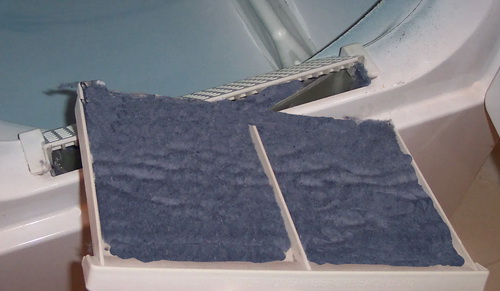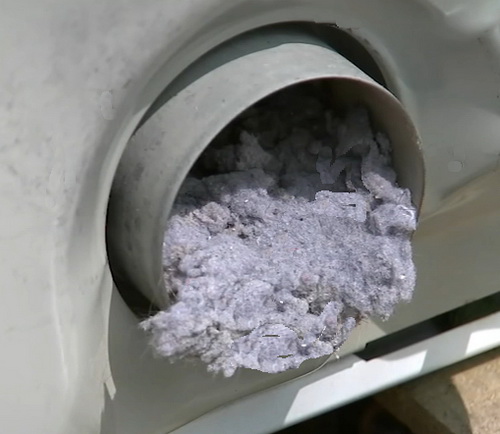Dryer not drying quickly. Wondering why your dryer takes a long time to dry clothes? Here are a variety of reasons why your clothes are not drying quickly. We will list some common problems that may occur and cause a dryer to take excessive time to dry. There are many possible solutions to help fix why a dryer takes longer to dry clothes. The solutions can be found below to assist you to fix your dryer. NOTE: Always check on the dryer display panel for dryer error codes to help understand the problem.
Tip: Future problems with your dryer can be minimized by cleaning or maintaining the dryer more often. Be sure to check air venting, proper air flow, and crimped vent hoses if you’re noticing longer drying times in your dryer. Lint buildup inside exhaust vents is a common cause of dryers taking too long to dry. Clean the lint filter, check the vent hose for clogs, inspect if the vent hose is bent, and or adjust temp settings, etc…
Fast Solutions To Fix Dryer Taking Too Long To Dry:
- Check that the heat and settings on the dryer panel are sufficient for the clothing load.
- If the dryer takes a long time to dry clothes, check the lint filter first and clean it out.
- Clean your dryer vent hose (at back of dryer) for clogs, bends, crimps, and or damage.
- When it takes a long time for your clothes to dry in the dryer, try not overloading it with too many clothes at once.
Explained Solutions To Fix Dryer Taking Too Long To Dry:
1 – Proper Temperature and Heat Settings?
Check temperature and time settings. Adjust the auto or timed drying setting to be sure it was set properly. If the dryer was set on a drying temperature or heat setting that does correlate with the clothing load, it may not dry as quickly.
2 – Dryer Lint Filter or Trap Is Blocked?
Check your lint traps to make sure they are clean with no debris, particularly pet fur. A blocked dryer lint trap can prevent air from flowing through and properly drying the clothes in a timely manner. The lint filter is the most common simple fix issue and should be cleaned with soap and water to let air flow through it.
 Check the lint filter and clean off lint
Check the lint filter and clean off lint
3 – Clothes Dryer Vent Hose Is Clogged?
A clogged dryer vent hose will cause your dryer to not dry properly and take longer than normal for clothes to get dry. This is the main reason for long dry times. Check if it is a dryer vent problem in the vent hose first. The vent hose itself could be clogged. To check if airflow is going through the hose, remove the vent hose from the wall and feel for air flow coming from the dryer. Then reconnect the vent and go outside and feel for air flow. The dryer vent needs to be clean all the way through the venting to the outside of your home. If you have a gas dryer, it will cycle the burner on and off quite fast if the vent is clogged, it will heat up and then cycle off and on once or twice per minute.
 Make sure no blockages in vent
Make sure no blockages in vent
4 – Dryer Vent Hose Is Bent?
Do not kink the dryer vent hose when you push the dryer back into place. If the dryer vent hose gets bent, the airflow from the dryer will not be able to escape and this will cause longer dry times. Always check that the vent hose is not crimped or bent.
5 – Fabric Softener Has Clogged The Drum?
Check the holes inside the dryer drum area. Often over time fabric softener can coat these small holes and cause air flow problems. The sometimes sticky substance in fabric softener, used over a long time, may clog the holes in the dryer drum. This prevents airflow and will cause the dryer to take longer to dry your clothing.
6 – Drying Different Fabrics At Once?
Do certain fabrics take longer to dry than others? For example, do you have fabrics like cotton sheets and towels that need more drying time than other delicate fabrics? Adjust accordingly to allow more drying time to certain types of clothing.
7 – Overloading The Dryer?
Do not overload your dryer with clothes that are too big for it to handle. A full dryer will take longer than a half-full one. Too many large items at once will take up more space so the dryer won’t dry properly. This means less room for heat circulation which will cause clothing to dry less faster.
8 – Lint Buildup Inside Of Dryer?
Lint can buildup within the dryer. You will have to access the inside of the dryer to fully clean out any lint buildup. To check inside the dryer, be sure to remove power to the dryer and remove the rear or upper panel to gain access into the dryer. Check inside the dryer (internally) at the blower inlet, near the moisture sensor (clean the moisture sensor with alcohol) near humidity sensors, and check and or clean the blower wheel. Lift up and inspect the blower wheel for any lint blockages in it that might be restricting air flow causing it to not dry clothes properly. Use a canister vacuum and remove all lint and dust within the dryer. Removing all the lint buildup will improve air flow and help the dryer to dry your clothes faster.
Dryer Hacks: Dryer not Drying Clothes
Other Issues That Can Cause A Dryer To Not Dry?
- Bad fuse – Check the Thermal fuse in the dryer.
- Faulty parts – Inspect the Thermistor to be sure it gets the proper ohms.
- Sensors issues – Check the Moisture Sensor for proper operation.
- Heating issues – Heating element for electric dryer or gas valves on gas dryer not working properly.
How Long Should a Dryer Take To Dry a Load of Clothes?
The average load of clothes should be dried in 30 minutes to an hour and a half. Drying time for clothing in a dryer depends on many factors, including temperature, humidity, type of clothing and material thickness.
Have questions on why your dryer won’t heat as fast as it once did? Leave a comment below and let us know how we can help!




Leave a Reply